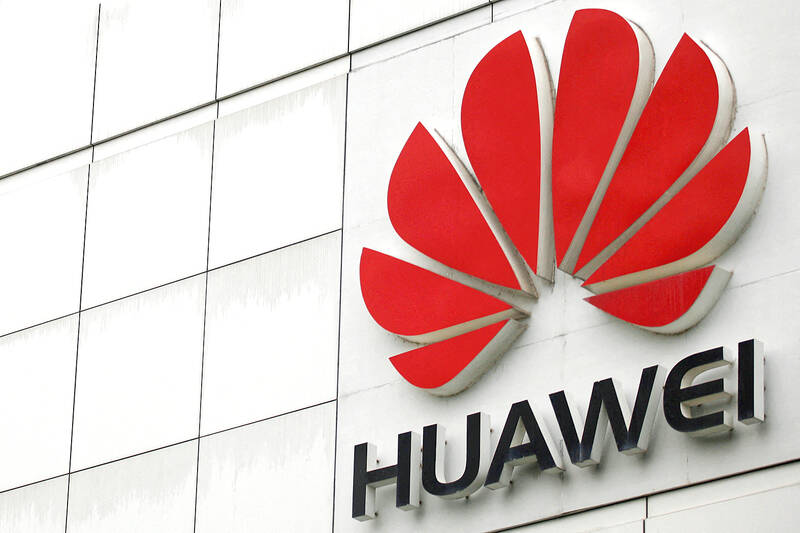Germany on Thursday said that it would phase out the use of components from Chinese telecom giants Huawei Technologies Co (華為) and ZTE Corp (中興) in its 5G networks in the coming years due to national security concerns.
It was the latest move by Berlin to reduce economic reliance on Beijing that some experts fear has left it vulnerable, and follows warnings from the EU that the firms pose a risk to the bloc.
Parts from Huawei and ZTE would no longer be used in “core” 5G mobile networks by the end of 2026 at the latest, the German Federal Ministry of the Interior said.

Photo: Reuters
In 5G access and transmission infrastructure, the systems of the telecom firms must be replaced by the end of 2029.
“We are protecting the central nervous systems of Germany as a business location — and we are protecting the communication of citizens, companies and the state,” German Minister of the Interior Nancy Faeser said.
“We must reduce security risks and, unlike in the past, avoid one-sided dependencies,” she said.
The ministry said that 5G networks form part of Germany’s “critical infrastructure” and are important for the functioning of sectors ranging from health to transport and energy.
Telecoms networks must be protected from cyberattacks, which could be an “existential threat,” it added.
Officials have reached agreements with Germany’s 5G network operators, Deutsche Telekom, Vodafone and Telefonica, on banning Huawei and ZTE.
Government sources had already indicated in September last year that Berlin was considering such a move, although the dates announced are later than those originally envisaged to give companies time to adopt the new measures.
Faeser would not be drawn on whether she feared retaliatory measures from China, although she said that Beijing had been informed about the bans.
“For me, as interior minister, it is a matter of finding regulations for telecommunications networks, for critical infrastructure, and I have done that,” she told a news conference.
In response to the ban, Huawei said there was “no specific evidence” that the firm’s “technology has cybersecurity risks.”
“Huawei has developed into a continuously innovative, secure, and reliable telecom equipment supplier in the German market,” a spokesperson said.
Beijing’s embassy in Berlin also said the move was driven by “groundless accusations.”
“There is no evidence indicating that these Chinese companies are a danger to any country,” the embassy said, according to state news agency Xinhua.
“Whether Germany can handle this issue fairly and justly will be a touchstone for its own business environment,” it added.
Factors that authorities looked at when deciding on the ban included whether the manufacturer was directly or indirectly controlled by the Chinese government, or whether they had been involved in activities that had a detrimental impact on Germany or other EU states.
The European Commission, the EU’s executive arm, last year described Huawei and ZTE as a risk to the bloc and called on EU member states to exclude the companies’ equipment from their mobile networks.

‘FORM OF PROTEST’: The German Institute Taipei said it was ‘shocked’ to see Nazi symbolism used in connection with political aims as it condemned the incident Sung Chien-liang (宋建樑), who led efforts to recall Democratic Progressive Party (DPP) Legislator Lee Kun-cheng (李坤城), was released on bail of NT$80,000 yesterday amid an outcry over a Nazi armband he wore to questioning the night before. Sung arrived at the New Taipei City District Prosecutors’ Office for questioning in a recall petition forgery case on Tuesday night wearing a red armband bearing a swastika, carrying a copy of Adolf Hitler’s Mein Kampf and giving a Nazi salute. Sung left the building at 1:15am without the armband and apparently covering the book with a coat. This is a serious international scandal and Chinese

A US Marine Corps regiment equipped with Naval Strike Missiles (NSM) is set to participate in the upcoming Balikatan 25 exercise in the Luzon Strait, marking the system’s first-ever deployment in the Philippines. US and Philippine officials have separately confirmed that the Navy Marine Expeditionary Ship Interdiction System (NMESIS) — the mobile launch platform for the Naval Strike Missile — would take part in the joint exercise. The missiles are being deployed to “a strategic first island chain chokepoint” in the waters between Taiwan proper and the Philippines, US-based Naval News reported. “The Luzon Strait and Bashi Channel represent a critical access

COUNTERINTELLIGENCE TRAINING: The ministry said 87.5 percent of the apprehended Chinese agents were reported by service members they tried to lure into becoming spies Taiwanese organized crime, illegal money lenders, temples and civic groups are complicit in Beijing’s infiltration of the armed forces, the Ministry of National Defense (MND) said in a report yesterday. Retired service members who had been turned to Beijing’s cause mainly relied on those channels to infiltrate the Taiwanese military, according to the report to be submitted to lawmakers ahead of tomorrow’s hearing on Chinese espionage in the military. Chinese intelligence typically used blackmail, Internet-based communications, bribery or debts to loan sharks to leverage active service personnel to do its bidding, it said. China’s main goals are to collect intelligence, and develop a

PERSONAL DATA: The implicated KMT members allegedly compiled their petitions by copying names from party lists without the consent of the people concerned Judicial authorities searched six locations yesterday and questioned six people, including one elderly Chinese Nationalist Party (KMT) member and five KMT Youth League associates, about alleged signature forgery and fraud relating to their recall efforts against two Democratic Progressive Party (DPP) legislators. After launching a probe into alleged signature forgery and related fraud in the KMT’s recall effort, prosecutors received a number of complaints, including about one petition that had 1,748 signatures of voters whose family members said they had already passed away, and also voters who said they did not approve the use of their name, Taipei Deputy Chief Prosecutor